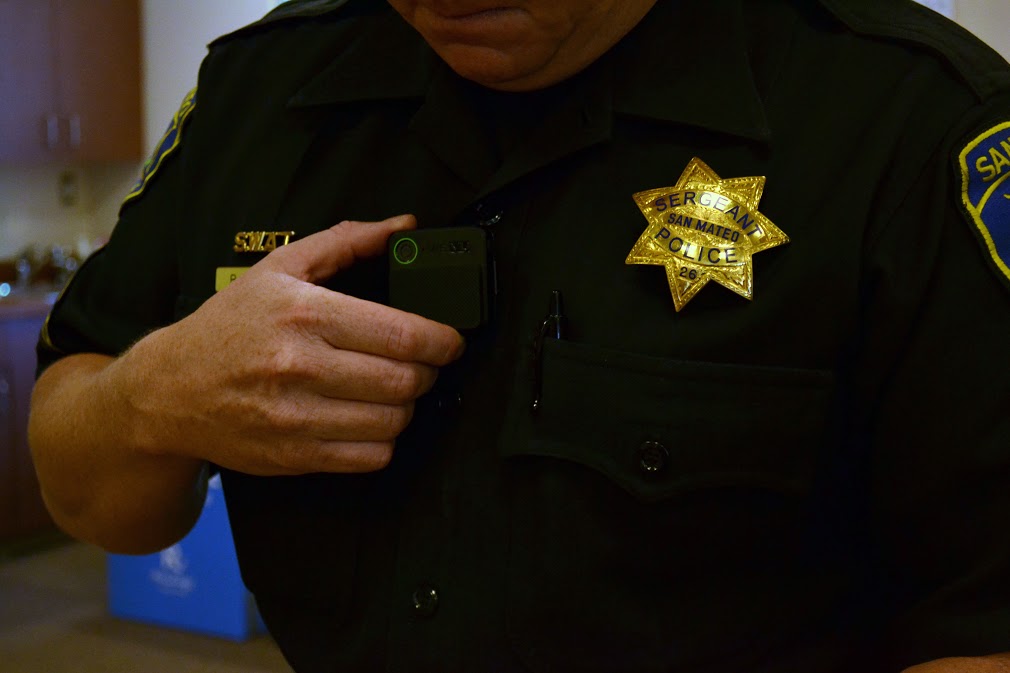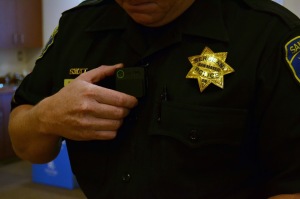
The SMPD is currently testing body cameras that record officers’ patrols, monitor police action and provide video evidence for cases.

The department has tested several different types of cameras, including VieVu, Vidmic, and GoPro models, in the hopes of finding the best one. “Our SWAT team uses quite a few GoPros,” says Sergeant Rick Decker. “[Whereas] we have a street crimes unit that wears a reduced uniform, so an officer in that unit is using [a newer VieVu model] because it’s a little less conspicuous, it’s lightweight, it’s easy to carry.”
According to a report by CNN, about 1200 law enforcement agencies across America use body cameras.
While the SMPD has not officially implemented body camera use throughout the department, recording evidence is already an established practice through the use of digital photography and audio recorders.
“First we dealt with digital photos and we figured that system out,” says Decker. “Once the technology caught up to what we wanted, then we did the digital recorders, the audio recorders and then once that caught up, we had that in place. Now we’re waiting for the cameras to catch up.”
The biggest problem with the body cameras is the battery life. “Our patrol officers work an eleven-hour shift and our patrol sergeants work twelve, so we need a device that can presumably work that long without a charge,” says Decker.
Another problem is storing the video data for extended periods of time. “Typically, retention for evidence is about seven years, so you’re talking at best that thing would have to hold seven years worth of digital evidence, which is just enormous,” adds Decker.
Despite these drawbacks, the SMPD officers recognize the benefit of having body cameras. “It’s somewhat of a security blanket for an officer to be able to turn it on. Everything’s documented [and] they don’t have to worry about taking notes,” says Decker. “If you give a police officer anything that helps [him or her] document what they’re doing and how things happen, they love it.”
Not only do cameras make records more accurate, they also help to ease tensions between the police and the public. “If I respond to a fight or something going on in a bar, if I walk in with a camera, there’s that immediate calming effect because now it’s permanent. Whatever they’re doing is [a] permanent record,” says Decker.
Aragon’s Dean Michael Valmonte believes that body cameras will also help reduce the profiling of minorities by police officers. He says, “Now you can’t really have indiscriminate pulling over if you have these body cams. You can keep track. So, I think it’s great, it’s a long time coming.”
Police cameras have also been found to reduce police use of force. In 2012, a study conducted by the Police Foundation in association with the Rialto Police Department (CA) examined the effects of police officers wearing body cameras on reported use of force and police-public interactions. The study found that wearing body cameras reduced use of force by officers from a mean of 1.46 incidents per 1000 police-public contacts to a mean of 0.33 incidents per 1000 police-public contacts.
“From a civil standpoint, generally officers don’t mind being recorded. In this day and age we’re always recorded,” says Decker. “You could do anything out in the public and more often than not there are three or four camera phones filming us.”
Privacy can be a problem with the general public, as a police officer might encounter someone who doesn’t want to be recorded.
However, Decker believes that in general, the public will not mind the police having cameras. “I think from the public’s perception they like to have that documentation available, especially if something happens where the officer’s judgement is in question.”
While public privacy may not be a large issue, the SMPD does recognize the problems with filming minors, particularly with the Student Resource Officers (SRO) at schools. “Those are questions that we would have to ask, we would look at whether or not [body cameras were] something [SROs] needed, and if so, what policies would be put in place for them,” says Decker.
Because the SROs want to build trust between the police department and the students, Decker adds, “I can’t foresee a situation where you’re going to see an SRO with a camera on all the time. It defeats the purpose of them being there.”
If the SRO did have a camera, he or she could not take them into locker rooms, bathrooms or classrooms.
Valmonte says, “It’d be an invasion of privacy for the teachers. The unions would never allow it and there’s no need for it. We’re talking about an educational environment, where, in education, there must be trust. So I don’t think that that’s the right place for the cameras. But for law enforcement, definitely.”
School and minor privacy will be one of the many policies discussed when the SMPD implement widespread camera use. “We would like to see consistency,” says Decker. “For instance, if we were going to turn it on for every traffic stop then let’s turn it on for every traffic stop. If I’m in line at Starbucks for coffee and someone comes up to argue a parking ticket, do I have to turn it on then?”
Decker concludes, “We’d never jump into anything. We’re going to make sure it’s right and that the technology is good.”
